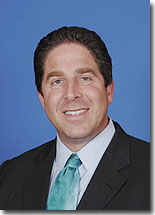Microsoft is a major sponsor for Education Nation, an NBC event promoting in-depth conversation about improving education in America. This is the second story in the series. Go
here
to read more in “The Education Community Speaks Out” Q&A series and for more information on Microsoft’s education efforts.
REDMOND, Wash. — Sept. 28, 2010 — As a self-described “education policy maven,” Rick Hess has spent his career studying education from a multitude of angles. In addition to his work at AEI, Hess has written a number of books on education and writes a regular blog, Education Week. He has taught at a number of universities, including Georgetown, Rice and Harvard. Hess has also worked with Microsoft on several projects, including the School of the Future in Philadelphia.

Richard Hess, policymaker, writer and educator at the American Enterprise Institute for Public Policy Research.
You recently published a book called “Stretching the School Dollar,” about how school districts can save money while best serving students. What do you think the role of technology is in that formula?
Hess: The thing about technology is, for decades we’ve viewed it as something we sprinkled on top of everything else, like sugar on a doughnut. And I don’t think that’s the way anybody ever gets a lot of value out of technological innovation.
Second, we should allow the best teachers and curriculum designers to deliver instruction to many more children than they used to be able to serve, or to design instructional programs that can serve not just hundreds of kids but hundreds of thousands of kids.
You taught high-school social studies before you were a policymaker. What do you miss about the classroom?
Hess: The work itself was a tremendous amount of fun. The opportunity for teachers to design instruction is fascinating — interacting with kids is a great way to spend a day. These are the things that I think draw people into teaching that I think anybody misses when they leave the classroom.
What do you think is working in education right now?
Hess: I think the biggest advances are new providers who are spending their time not trying to work around aged policies and bureaucracies, but who are building something new. Some of these are new school builders, like the KIPP charter schools, or Achievement First, or National Heritage Academies. For me, some of the most exciting ones are the specialized new providers that are building the kinds of tools and resources that can help teachers in an array of classrooms and learning environments — firms designing new school systems and system technologies like Schoolnet or Wireless Generation.
You’ve written about the need for hiring new, eager teachers in the work force. What would you say to people considering careers in teaching right now?
Hess: We’ve made a lot of fuss in the last decade about how teaching is noble work. And that’s true, but I also think teaching is incredibly enjoyable, interesting work. But for me at least, one of the things that led me to leave the profession was that there was little opportunity to grow as a professional, to be rewarded if I excelled, and little chance to take on and learn new skills. So what I would encourage people to think about is how they find teaching opportunities in organizations that are going to value them not just as cogs but as professionals who are going to want to grow and develop.
Describe how you spent your summer and one of the most memorable days from it.
Hess: I spent three weeks in the Republic of Georgia, working with the Ministry of Education, trying to lend a hand with their efforts to improve Georgia schools. I taught at the business school at Rice University in a principal preparation program I helped lead. And we spent a couple of weeks traveling Budapest, Prague and Vienna. My wife and I had a terrific day really just walking old Budapest and stopping in cafes and taking in the great city.




